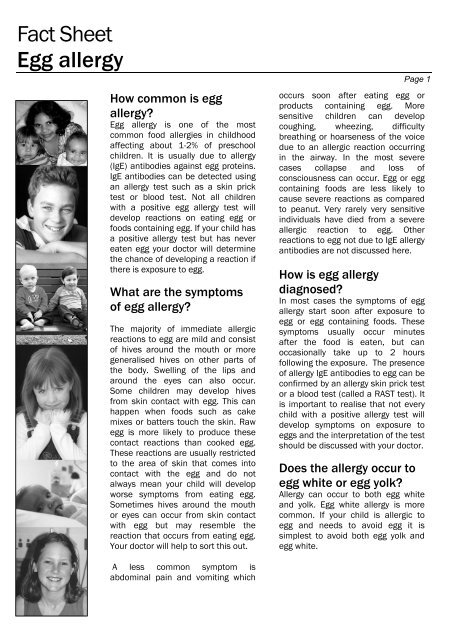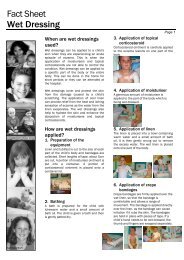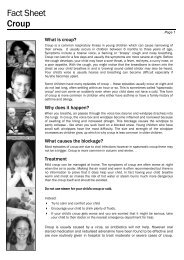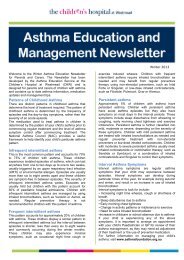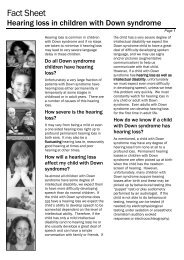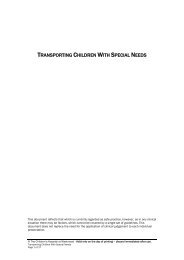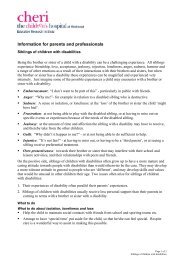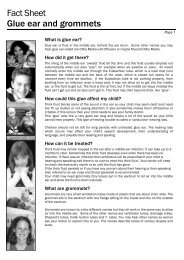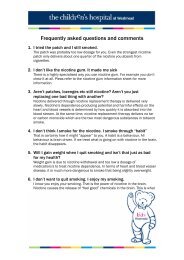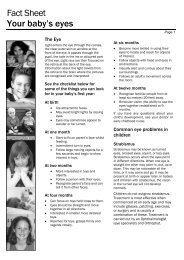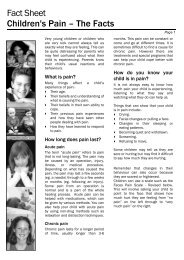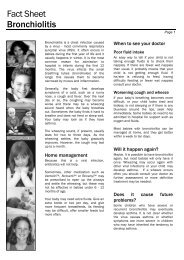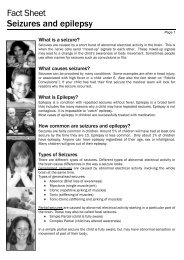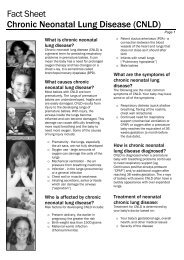Fact Sheet Egg allergy - Kids Health @ CHW
Fact Sheet Egg allergy - Kids Health @ CHW
Fact Sheet Egg allergy - Kids Health @ CHW
You also want an ePaper? Increase the reach of your titles
YUMPU automatically turns print PDFs into web optimized ePapers that Google loves.
<strong>Fact</strong> <strong>Sheet</strong><br />
<strong>Egg</strong> <strong>allergy</strong><br />
xcvxcvxcv<br />
How common is egg<br />
<strong>allergy</strong>?<br />
<strong>Egg</strong> <strong>allergy</strong> is one of the most<br />
common food allergies in childhood<br />
affecting about 1-2% of preschool<br />
children. It is usually due to <strong>allergy</strong><br />
(IgE) antibodies against egg proteins.<br />
IgE antibodies can be detected using<br />
an <strong>allergy</strong> test such as a skin prick<br />
test or blood test. Not all children<br />
with a positive egg <strong>allergy</strong> test will<br />
develop reactions on eating egg or<br />
foods containing egg. If your child has<br />
a positive <strong>allergy</strong> test but has never<br />
eaten egg your doctor will determine<br />
the chance of developing a reaction if<br />
there is exposure to egg.<br />
What are the symptoms<br />
of egg <strong>allergy</strong>?<br />
The majority of immediate allergic<br />
reactions to egg are mild and consist<br />
of hives around the mouth or more<br />
generalised hives on other parts of<br />
the body. Swelling of the lips and<br />
around the eyes can also occur.<br />
Some children may develop hives<br />
from skin contact with egg. This can<br />
happen when foods such as cake<br />
mixes or batters touch the skin. Raw<br />
egg is more likely to produce these<br />
contact reactions than cooked egg.<br />
These reactions are usually restricted<br />
to the area of skin that comes into<br />
contact with the egg and do not<br />
always mean your child will develop<br />
worse symptoms from eating egg.<br />
Sometimes hives around the mouth<br />
or eyes can occur from skin contact<br />
with egg but may resemble the<br />
reaction that occurs from eating egg.<br />
Your doctor will help to sort this out.<br />
A less common symptom is<br />
abdominal pain and vomiting which<br />
Page 1<br />
occurs soon after eating egg or<br />
products containing egg. More<br />
sensitive children can develop<br />
coughing, wheezing, difficulty<br />
breathing or hoarseness of the voice<br />
due to an allergic reaction occurring<br />
in the airway. In the most severe<br />
cases collapse and loss of<br />
consciousness can occur. <strong>Egg</strong> or egg<br />
containing foods are less likely to<br />
cause severe reactions as compared<br />
to peanut. Very rarely very sensitive<br />
individuals have died from a severe<br />
allergic reaction to egg. Other<br />
reactions to egg not due to IgE <strong>allergy</strong><br />
antibodies are not discussed here.<br />
How is egg <strong>allergy</strong><br />
diagnosed?<br />
In most cases the symptoms of egg<br />
<strong>allergy</strong> start soon after exposure to<br />
egg or egg containing foods. These<br />
symptoms usually occur minutes<br />
after the food is eaten, but can<br />
occasionally take up to 2 hours<br />
following the exposure. The presence<br />
of <strong>allergy</strong> IgE antibodies to egg can be<br />
confirmed by an <strong>allergy</strong> skin prick test<br />
or a blood test (called a RAST test). It<br />
is important to realise that not every<br />
child with a positive <strong>allergy</strong> test will<br />
develop symptoms on exposure to<br />
eggs and the interpretation of the test<br />
should be discussed with your doctor.<br />
Does the <strong>allergy</strong> occur to<br />
egg white or egg yolk?<br />
Allergy can occur to both egg white<br />
and yolk. <strong>Egg</strong> white <strong>allergy</strong> is more<br />
common. If your child is allergic to<br />
egg and needs to avoid egg it is<br />
simplest to avoid both egg yolk and<br />
egg white.
<strong>Fact</strong> <strong>Sheet</strong><br />
<strong>Egg</strong> <strong>allergy</strong><br />
xcvxcvxcv<br />
My child seems to react to<br />
raw but not cooked egg.<br />
What does this mean?<br />
Some of the <strong>allergy</strong> inducing parts of<br />
the egg are altered by heat used in<br />
cooking and become less likely to<br />
cause a reaction This explains why<br />
some people react to raw or lightly<br />
cooked but not well cooked egg.<br />
However other children will react to<br />
both raw and cooked eggs. Many<br />
children with egg <strong>allergy</strong> can tolerate<br />
small amounts of baked egg in cakes<br />
and muffins. You should discuss<br />
whether your child might be able to<br />
do this with your doctor.<br />
How do I avoid exposing<br />
my child to egg?<br />
<strong>Egg</strong> or egg products may be found in<br />
foods we don't always expect them to<br />
be in. It pays to know where to look. It<br />
is important to use common sense<br />
and read food labels carefully. <strong>Egg</strong><br />
can also be in prepared foods that<br />
may not have a food label attached.<br />
The following foods often contain egg:<br />
Page 2<br />
Note: Some children with egg<br />
sensitivity are able to eat cooked<br />
foods containing small amounts of<br />
egg without developing a reaction.<br />
Your doctor can advise you about<br />
this. Do not give your child egg<br />
containing foods unless this has been<br />
discussed with your doctor.<br />
What about foods with a<br />
label that says "may<br />
contain traces of egg"?<br />
Some foods may carry a warning on<br />
the label "may contain traces of egg".<br />
This usually indicates that the food is<br />
made in a facility that also makes<br />
other foods which do contain egg.<br />
Discuss what to do about these foods<br />
with your doctor.<br />
Asian dishes Mayonnaise<br />
Battered food Melts<br />
Binding for rissoles, patties, meatloaf Milk puddings<br />
Biscuits Mock or butter cream<br />
Cakes Mousse<br />
Cake mixes Muffins and muffin mixes<br />
Confectionary eg. marshmallows Naan bread<br />
Croissants Nougat<br />
Crumbed foods Pie fillings<br />
Custards Prepared soups, clear soups, consommes<br />
Dessert mixes Prepared meats<br />
Dips Puddings<br />
<strong>Egg</strong> noodles and pasta Rissoles, sausages<br />
Fried rice Salad dressings<br />
<strong>Health</strong> drinks Some breads, breaded foods<br />
Ice cream, frozen desserts and sherbets Shiny glaze on baked goods<br />
Icings Tarts and pastry<br />
Malted chocolate drinks, eg. Ovaltine Vegetarian meat substitutes
<strong>Fact</strong> <strong>Sheet</strong><br />
<strong>Egg</strong> <strong>allergy</strong><br />
xcvxcvxcv<br />
Does my child have to<br />
avoid eating chicken?<br />
No. Allergy to chicken is very<br />
uncommon and is different to egg<br />
<strong>allergy</strong>.<br />
What is an Epipen?<br />
An Epipen is an emergency device<br />
which injects a dose of adrenaline<br />
into the muscle. It is used to treat<br />
severe reactions to egg. Adrenaline<br />
reverses the severe allergic reaction<br />
and can be lifesaving.<br />
Should my child have an<br />
Epipen?<br />
Children who have had a serious<br />
reaction to egg with involvement of<br />
the breathing passages should have<br />
an Epipen. The need for other<br />
children and babies to have an<br />
Epipen depends on a number of<br />
factors which should be discussed<br />
with your doctor. If you have an<br />
Epipen it is very important that you<br />
understand how and when to use it<br />
and that you have a written<br />
anaphylaxis action plan provided by<br />
your doctor.<br />
Can my child grow out of<br />
egg <strong>allergy</strong>?<br />
Many infants and young children will<br />
grow out of their egg <strong>allergy</strong>.<br />
Approximately 2/3 will grow out of<br />
their <strong>allergy</strong> by 5-10 years of age.<br />
Those children who have had milder<br />
allergic reactions with only skin<br />
reactions are more likely to outgrow<br />
their <strong>allergy</strong> than children with more<br />
severe reactions. Your doctor can<br />
determine whether egg <strong>allergy</strong> is still<br />
present by monitoring the <strong>allergy</strong><br />
tests every 12 months or so.<br />
Page 3<br />
Is my child likely to have a<br />
severe reaction from<br />
casual contact with egg<br />
product on benches, other<br />
children's hands or by<br />
smelling eggs?<br />
No. Severe reactions from casual<br />
contact are extremely rare.<br />
Can I prevent egg <strong>allergy</strong><br />
in my future children?<br />
There are no steps which can<br />
guarantee a child will not develop egg<br />
<strong>allergy</strong>. There is no evidence that<br />
avoiding eggs in pregnancy prevents<br />
egg <strong>allergy</strong> in the baby. The evidence<br />
is unclear whether avoidance of eggs<br />
by the mother while breastfeeding will<br />
alter the development of egg <strong>allergy</strong><br />
in the baby.<br />
What about immunisation<br />
should my child avoid any<br />
vaccines?<br />
It used to be thought that measles<br />
immunisation should not be given to<br />
egg allergic children. This is incorrect.<br />
The measles vaccine is safe in all egg<br />
allergic children as is not grown in<br />
hen eggs and all egg allergic children<br />
should have measles vaccine.<br />
Influenza vaccine is grown in hens<br />
eggs and can usually be given to egg<br />
allergic children under the<br />
supervision of an allergist. Discuss<br />
Influenza and Yellow fever<br />
vaccination (if required) with your<br />
doctor.
<strong>Fact</strong> <strong>Sheet</strong><br />
<strong>Egg</strong> <strong>allergy</strong><br />
xcvxcvxcv<br />
Remember:<br />
If you are unsure about something<br />
discuss it with your doctor.<br />
Most children will outgrow their<br />
egg <strong>allergy</strong>.<br />
Where can I find more<br />
information on the<br />
Internet?<br />
The <strong>CHW</strong> diet sheets available on<br />
www.chw.edu.au/parents/factshe<br />
ets/<br />
The Australian Society of Clinical<br />
Immunology and Allergy (ASCIA)<br />
website contains useful<br />
information on food <strong>allergy</strong> written<br />
by Australian specialists<br />
(www.<strong>allergy</strong>.org.au).<br />
The patient support group<br />
Anaphylaxis Australia offers<br />
valuable updates and tips for<br />
dealing with food allergies<br />
(www.<strong>allergy</strong>facts.org.au).<br />
Written by the Department of Allergy,<br />
Immunology and Infectious diseases<br />
The Children’s Hospital at Westmead.<br />
Page 4<br />
This fact sheet is for education purposes only.<br />
Please consult with your doctor or other health professional<br />
to make sure this information is right for your child. This document was reviewed on 7 th July 2010<br />
www.chw.edu.au www.sch.edu.au www.kaleidoscope.org.au<br />
© The Children’s Hospital at Westmead, Sydney Children’s Hospital, Randwick & Kaleidoscope * Hunter Children’s <strong>Health</strong> Network – 2005-2010


